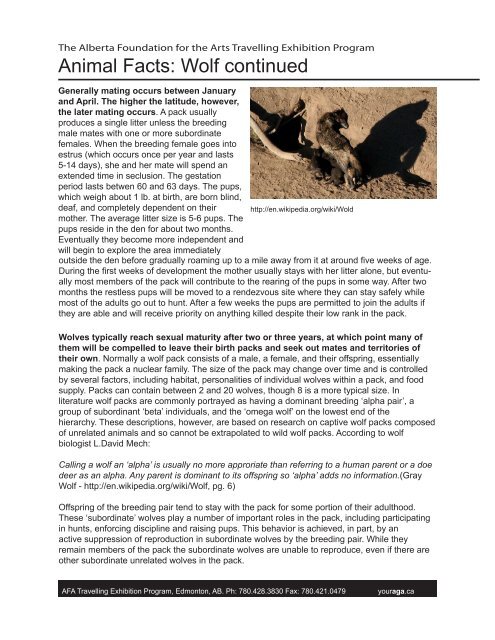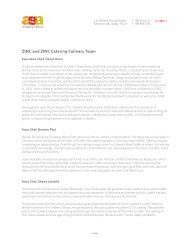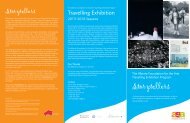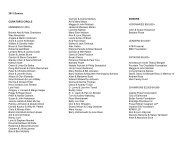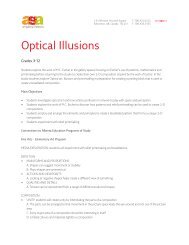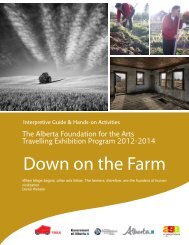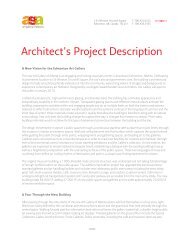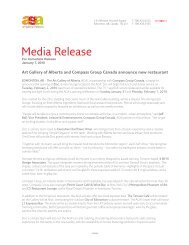Urban Animals - Art Gallery of Alberta
Urban Animals - Art Gallery of Alberta
Urban Animals - Art Gallery of Alberta
Create successful ePaper yourself
Turn your PDF publications into a flip-book with our unique Google optimized e-Paper software.
The <strong>Alberta</strong> Foundation for the <strong>Art</strong>s Travelling Exhibition Program<br />
Animal Facts: Wolf continued<br />
Generally mating occurs between January<br />
and April. The higher the latitude, however,<br />
the later mating occurs. A pack usually<br />
produces a single litter unless the breeding<br />
male mates with one or more subordinate<br />
females. When the breeding female goes into<br />
estrus (which occurs once per year and lasts<br />
5-14 days), she and her mate will spend an<br />
extended time in seclusion. The gestation<br />
period lasts betwen 60 and 63 days. The pups,<br />
which weigh about 1 lb. at birth, are born blind,<br />
deaf, and completely dependent on their http://en.wikipedia.org/wiki/Wold<br />
mother. The average litter size is 5-6 pups. The<br />
pups reside in the den for about two months.<br />
Eventually they become more independent and<br />
will begin to explore the area immediately<br />
outside the den before gradually roaming up to a mile away from it at around five weeks <strong>of</strong> age.<br />
During the first weeks <strong>of</strong> development the mother usually stays with her litter alone, but eventually<br />
most members <strong>of</strong> the pack will contribute to the rearing <strong>of</strong> the pups in some way. After two<br />
months the restless pups will be moved to a rendezvous site where they can stay safely while<br />
most <strong>of</strong> the adults go out to hunt. After a few weeks the pups are permitted to join the adults if<br />
they are able and will receive priority on anything killed despite their low rank in the pack.<br />
Wolves typically reach sexual maturity after two or three years, at which point many <strong>of</strong><br />
them will be compelled to leave their birth packs and seek out mates and territories <strong>of</strong><br />
their own. Normally a wolf pack consists <strong>of</strong> a male, a female, and their <strong>of</strong>fspring, essentially<br />
making the pack a nuclear family. The size <strong>of</strong> the pack may change over time and is controlled<br />
by several factors, including habitat, personalities <strong>of</strong> individual wolves within a pack, and food<br />
supply. Packs can contain between 2 and 20 wolves, though 8 is a more typical size. In<br />
literature wolf packs are commonly portrayed as having a dominant breeding ‘alpha pair’, a<br />
group <strong>of</strong> subordinant ‘beta’ individuals, and the ‘omega wolf’ on the lowest end <strong>of</strong> the<br />
hierarchy. These descriptions, however, are based on research on captive wolf packs composed<br />
<strong>of</strong> unrelated animals and so cannot be extrapolated to wild wolf packs. According to wolf<br />
biologist L.David Mech:<br />
Calling a wolf an ‘alpha’ is usually no more approriate than referring to a human parent or a doe<br />
deer as an alpha. Any parent is dominant to its <strong>of</strong>fspring so ‘alpha’ adds no information.(Gray<br />
Wolf - http://en.wikipedia.org/wiki/Wolf, pg. 6)<br />
Offspring <strong>of</strong> the breeding pair tend to stay with the pack for some portion <strong>of</strong> their adulthood.<br />
These ‘subordinate’ wolves play a number <strong>of</strong> important roles in the pack, including participating<br />
in hunts, enforcing discipline and raising pups. This behavior is achieved, in part, by an<br />
active suppression <strong>of</strong> reproduction in subordinate wolves by the breeding pair. While they<br />
remain members <strong>of</strong> the pack the subordinate wolves are unable to reproduce, even if there are<br />
other subordinate unrelated wolves in the pack.<br />
AFA Travelling Exhibition Program, Edmonton, AB. Ph: 780.428.3830 Fax: 780.421.0479<br />
youraga.ca


